
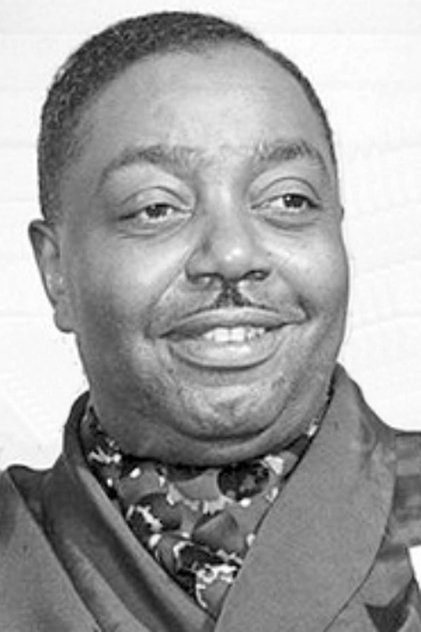
Big Joe Turner
Born: May 18, 1911
Died: November 24, 1985
in Kansas City, Missouri, USA
Died: November 24, 1985
in Kansas City, Missouri, USA
Joseph Vernon "Big Joe" Turner Jr. (May 18, 1911 – November 24, 1985) was an American singer from Kansas City, Missouri. According to songwriter Doc Pomus, "Rock and roll would have never happened without him." His greatest fame was due to his rock-and-roll recordings in the 1950s, particularly "Shake, Rattle and Roll", but his career as a performer endured from the 1920s into the 1980s.
Turner was inducted into the Rock and Roll Hall of Fame in 1987, with the Hall lauding him as "the brawny voiced 'Boss of the Blues'".
Turner was born May 18, 1911, in Kansas City, Missouri, United States. His father was killed in a train accident when Turner was four years old. He sang in his church, and on street corners for money. He left school at age fourteen to work in Kansas City's nightclubs, first as a cook and later as a singing bartender. He became known as "The Singing Barman", and worked in such venues as the Kingfish Club and the Sunset, where he and his partner, the boogie-woogie pianist Pete Johnson, became resident performers. The Sunset was managed by Piney Brown. It featured "separate but equal" facilities for white patrons. Turner wrote "Piney Brown Blues" in his honor and sang it throughout his career.
At that time Kansas City nightclubs were subject to frequent raids by the police; Turner said, "The Boss man would have his bondsmen down at the police station before we got there. We'd walk in, sign our names and walk right out. Then we would cabaret until morning."
His partnership with Johnson proved fruitful. Together they went to New York City in 1936, where they appeared on a playbill with Benny Goodman, but as Turner recounted, "After our show with Goodman, we auditioned at several places, but New York wasn't ready for us yet, so we headed back to K.C." Eventually they were seen by the talent scout John Hammond in 1938, who invited them back to New York to appear in one of his From Spirituals to Swing concerts at Carnegie Hall, which were instrumental in introducing jazz and blues to a wider American audience.
In part because of their appearance at Carnegie Hall, Turner and Johnson had a major success with the song "Roll 'Em Pete". The track was basically a collection of traditional blues lyrics. It was a song that Turner recorded many times, with various musicians, over the ensuing years.
In 1939, along with the boogie-woogie pianists Albert Ammons and Meade Lux Lewis, Turner and Johnson began a residency at Café Society, a nightclub in New York City, where they appeared on the same playbill as Billie Holiday and Frankie Newton's band. Besides "Roll 'Em, Pete", Turner's best-known recordings from this period are probably "Cherry Red", "I Want a Little Girl" and "Wee Baby Blues". "Cherry Red" was recorded in 1939 for the Vocalion label, with Hot Lips Page on trumpet and a full band in attendance. During the next year Turner contracted with Decca and recorded "Piney Brown Blues" with Johnson on piano. ...
Source: Article "Big Joe Turner" from Wikipedia in English, licensed under CC-BY-SA 3.0.
Turner was inducted into the Rock and Roll Hall of Fame in 1987, with the Hall lauding him as "the brawny voiced 'Boss of the Blues'".
Turner was born May 18, 1911, in Kansas City, Missouri, United States. His father was killed in a train accident when Turner was four years old. He sang in his church, and on street corners for money. He left school at age fourteen to work in Kansas City's nightclubs, first as a cook and later as a singing bartender. He became known as "The Singing Barman", and worked in such venues as the Kingfish Club and the Sunset, where he and his partner, the boogie-woogie pianist Pete Johnson, became resident performers. The Sunset was managed by Piney Brown. It featured "separate but equal" facilities for white patrons. Turner wrote "Piney Brown Blues" in his honor and sang it throughout his career.
At that time Kansas City nightclubs were subject to frequent raids by the police; Turner said, "The Boss man would have his bondsmen down at the police station before we got there. We'd walk in, sign our names and walk right out. Then we would cabaret until morning."
His partnership with Johnson proved fruitful. Together they went to New York City in 1936, where they appeared on a playbill with Benny Goodman, but as Turner recounted, "After our show with Goodman, we auditioned at several places, but New York wasn't ready for us yet, so we headed back to K.C." Eventually they were seen by the talent scout John Hammond in 1938, who invited them back to New York to appear in one of his From Spirituals to Swing concerts at Carnegie Hall, which were instrumental in introducing jazz and blues to a wider American audience.
In part because of their appearance at Carnegie Hall, Turner and Johnson had a major success with the song "Roll 'Em Pete". The track was basically a collection of traditional blues lyrics. It was a song that Turner recorded many times, with various musicians, over the ensuing years.
In 1939, along with the boogie-woogie pianists Albert Ammons and Meade Lux Lewis, Turner and Johnson began a residency at Café Society, a nightclub in New York City, where they appeared on the same playbill as Billie Holiday and Frankie Newton's band. Besides "Roll 'Em, Pete", Turner's best-known recordings from this period are probably "Cherry Red", "I Want a Little Girl" and "Wee Baby Blues". "Cherry Red" was recorded in 1939 for the Vocalion label, with Hot Lips Page on trumpet and a full band in attendance. During the next year Turner contracted with Decca and recorded "Piney Brown Blues" with Johnson on piano. ...
Source: Article "Big Joe Turner" from Wikipedia in English, licensed under CC-BY-SA 3.0.
Movies for Big Joe Turner...
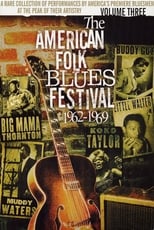
Title: The American Folk Blues Festival 1962-1969, Vol. 3
Character: Self
Released: August 31, 2004
Type: Movie
Taken from the European tours organised for American blues musicians between 1962 and 1969, this release features performances by several popular blues artists, including: Big Mama Thornton, Roosevelt Sykes, Buddy Guy, Dr. Isaiah Ross, Big Joe Turner, Skip James, Bukka White, Son House, Hound Dog Taylor and Little Walter, Koko Taylor and Little Walter, Sonny Terry and Brownie McGhee, Helen Humes, Earl Hooker, and Muddy Waters.

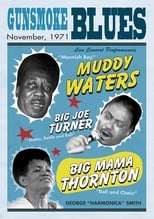
Title: Gunsmoke Blues
Character: Self
Released: August 24, 2004
Type: Movie
One weekend in November, 1971, bluesfreak, Link Wyler and his buddies from the Gunsmoke TV crew, gave in to temptation. On production hiatus, they bolted Hollywood to go and film Muddy Waters, Big Mama Thornton, Big Joe Turner and George "Harmonica" Smith, who were then barnstorming the U.S. Pacific Northwest with their bands.

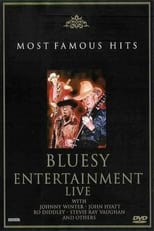
Title: Bluesy Entertainment: Live
Character: Self
Released: June 30, 2003
Type: Movie
1. Introduction 2. Someday Baby - Gregg Allman 3. Just To Be With You - Phoebe Snow 4. Chains Of Love - Big Joe Turner 5. Make A Woman Feel Satisfied - George "Buddy" Guy 6. Sweet Papa John - Johnny Winter 7. Big Legged Woman - John Hyatt 8. Baby Don't You Know - Roy Milton 9. Porty Days And Porty Nights - Nick Grave Nites 10. Texas Plood - Stevie Ray Vaughan 11. (I'm Your) Hoochie Coochie Man - Big Hill Morganfield 12. Misery - Esther Phillips 13. Rollin' And Tumblin' - Peter Wolfe 14. The Thrill Is Gone - B.B. King 15. I'm Ready - Koko Taylor 16. Bo Diddley - Bo Diddley 17. Mean Black Spider - Robert Lockwood 18. Gypsy Woman - Matt Shannon 19. Two Trains Running - Keb Mo 20. Follow the Blues

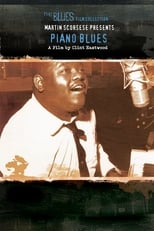
Title: Piano Blues
Character: Self (archive footage)
Released: January 1, 2003
Type: Movie
Director — and piano player — Clint Eastwood explores his life-long passion for piano blues, using a treasure trove of rare historical footage in addition to interviews and performances by such living legends as Pinetop Perkins and Jay McShann, as well as Dave Brubeck and Marcia Ball.

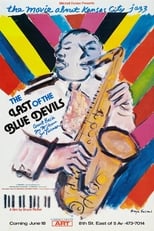
Title: The Last Of The Blue Devils - The Kansas City Jazz Story
Character: Self
Released: October 1, 1979
Type: Movie
Documentary film detailing the history of Kansas City jazz.



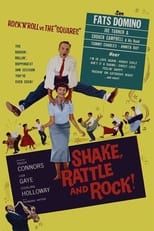
Title: Shake, Rattle and Rock!
Character: Big Joe Turner
Released: November 1, 1956
Type: Movie
A TV star meets with opposition from adults who object to the opening of a rock 'n' roll palace for teens.

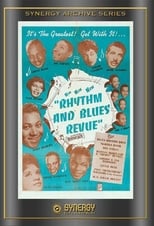
Title: Rhythm and Blues Revue
Character: Self
Released: January 1, 1955
Type: Movie
Rhythm and Blues Revue is a plotless variety show, one of several compiled for theatrical exhibition from the made-for-television short films produced by Snader and Studio Telescriptions, with newly-filmed host segments by Willie Bryant. Originally 86 minutes, the "short" version available on public domain collections and websites is missing a reel
